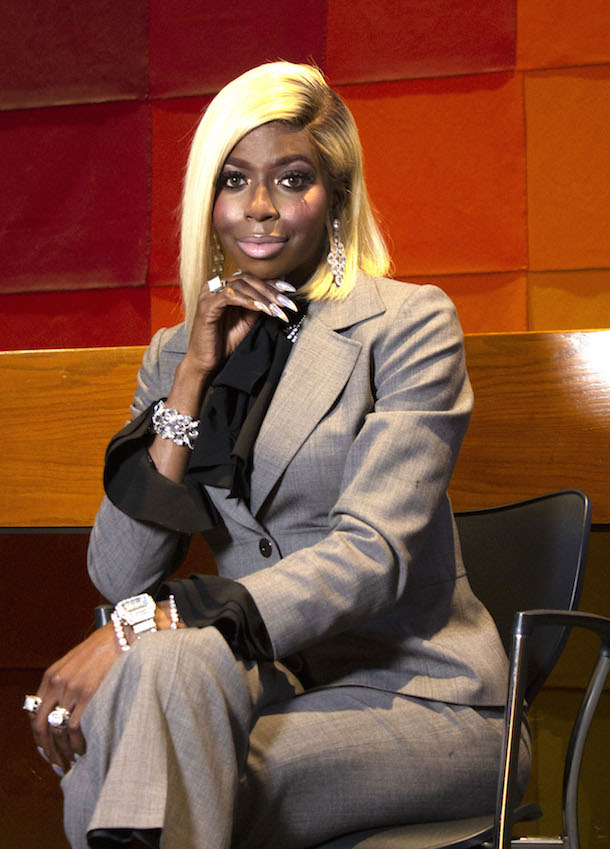
Empowering Her Community
Mia Ryan launches a support group for black transgender women.

UT Health outreach worker Mia Ryan faced many challenges before becoming a pioneering transgender activist.
Born in Galveston, she grew up with her family in La Marque, Texas. At the age of 13, Ryan was forced out of her mother and stepfather’s home because she was trans.
“Due to being displaced, I was forced to engage in survival sex work,” Ryan recalls. “I had to navigate the streets alone.”
“I created the group because I felt like black trans women lacked spaces where we could fellowship with other community members and just decompress. There aren’t enough spaces in Houston for black trans women to do this.”
In 2013, Ryan shared her story with the world on Houston Beauty, an Oprah Winfrey Network reality television show that followed the goings-on at Franklin Beauty School, a historic Space City cosmetology institute. Ryan became the show’s breakout star, and is still internationally recognized as one of the first trans women to have a recurring storyline on a major network TV show.
However, after the show ended, Ryan’s life wasn’t picture-perfect. “I was thrust into the limelight, but nothing about my life changed,” she admits. “I still dealt with issues of not having the means and finances to make ends meet.” However, she remained optimistic.
Ryan stopped working as an escort and moved to Atlanta in 2014 in search of job opportunities. After six months, she again experienced homelessness and moved to Houston a year later.
In Houston, Ryan gained some financial stability and began doing activist work. In 2017, she lobbied against SB 6, a statewide bill that regulated bathroom use for trans Texans. She also assisted University of Houston-Clear Lake professor William T. Hoston in writing his award-winning book Toxic Silence: Race, Black Gender Identity, and Addressing the Violence against Black Transgender Women in Houston.
Ryan was pushed further into the world of LGBTQ activism following the murder of Brandi Seals, who was shot to death in December 2017. After a Houston Police Department (HPD) detective misgendered and deadnamed Seals to media outlets, Ryan stepped up to call out both law enforcement and the media outlets for disrespecting victims like Seals in the narratives associated with their murders.

“We are so tired of seeing our sisters senselessly murdered in the streets,” Ryan said during Seals’ vigil. “At this point, we just want peace. And we want respect.” HPD Chief Art Acevedo issued an apology during the same memorial event, which sparked the creation of HPD’s cultural-sensitivity training through the Montrose Center.
Ryan, who was instrumental in working with Seals’ relatives to plan her funeral, helped the family find a trans-affirming pastor to eulogize her during the service. Ryan also worked as the mortuary cosmetologist for the ceremony.
“After preparing Brandi’s body, I had to step away from activism for a bit,” Ryan says. “Seeing a black trans woman in a casket, knowing that her reality was my reality and the reality of so many others, hit really close to home. I had a lot of grief.”
After about a year of mourning, Ryan resumed her trans advocacy work. On November 7, she launched Sister to Sister Support Group, a weekly meeting for black trans women and their allies to meet and discuss their issues. The group meets on Thursdays from 7 to 8 p.m. at the Montrose Center.
“I created the group because I felt like the black trans women lacked spaces where we could fellowship with other community members and just decompress,” Ryan says. “There aren’t enough safe spaces in Houston for black trans women to do this.”
Sister to Sister has seen around 10 attendees each week since its launch. During the meetings, Ryan has provided healthcare and housing referrals to attendees looking for assistance.
While the support group is also open to the allies of black trans women, it is hard for members of marginalized communities to build trust with folks who are outsiders, Ryan says. She kindly requests that any allies who want to attend Sister to Sister send her a message on the group’s Facebook page first, because “I want to make sure I’m intentional about who this space is for, and that everyone feels safe.”

Although the support group is only in its beginning phases, Ryan has many plans for Sister to Sister this year. In December, the group partnered with chef Angelina Marie, a trans woman who owns The Dreaming Oven bakery, to host a holiday charity event that benefitted trans children. Going forward, she hopes to see the group continue to uplift trans businesswomen in Houston. “I want to pour even more support into my community.”
Outside of her advocacy work, Ryan is a full-time college student and has an outreach-worker position at UT Health with Dr. Jonatan Gioia. While she had to keep the specifics of what the two are working on under wraps, Ryan says she’s “involved in two projects that will be very beneficial for trans people.”
Keep an eye out for Ryan in 2020. Without a doubt, we’ll be seeing much more of her advocacy work in Houston this year.
For more information about Sister to Sister Support Group, visit facebook.com/SisterToSisterHOU/. Stay connected with Mia Ryan online at tinyurl.com/FacebookMiaRyan.
This article appears in the January 2020 edition of OutSmart magazine.











Comments